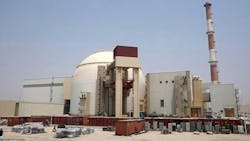Iran Seeks New Russia Reactor in Exchange for Oil
MOSCOW -- Iran's ambassador to Moscow today said Russia could build the Islamic republic a second nuclear power reactor under a proposed oil-for-goods swap that has raised grave concern in Washington.
Ambassador Mehdi Sanaei said the two close trading partners have been negotiating Iran's delivery of hundreds of thousands of barrels of oil a day since a meeting at a regional summit in September between Russian President Vladimir Putin and his counterpart Hassan Rouhani.
Russian officials have neither confirmed nor denied the discussions while stressing that they would not break existing U.N. sanctions on the Islamic state.
But Washington and the European Union have imposed their own restrictions over Tehran's disputed nuclear program that also penalize countries and companies dealing in certain areas with Iran.
The White House has raised "serious concern" about the potential deal -- which one Russian report said involved the delivery of 500,000 barrels of crude per day -- because it would boost Iran's oil exports by more than 50%.
Iran's crude shipments are believed to have shrunk under the impact of the unilateral Western sanctions to less than a million barrels per day from the 2.5-million-barrel level they reached in late 2011.
Sanaei said Iran was interested in acquiring Russian heavy trucks and railroad equipment in exchange for the oil deliveries.
"A part of the funds [from the oil sales] could also go toward the construction by Russian companies of a second nuclear reactor at Bushehr," Sanaei told Kommersant.
Russia completed the construction of the Islamic republic's sole nuclear power plant once the project was dropped by Germany's industrial giant Siemens following Iran's 1979 revolution.
The plant's single reactor produces 1,000 megawatts of electricity -- a small fraction of what the oil-rich country says it wants to produce from nuclear power.
Tehran has fervently rejected Western and Israeli suspicions that its nuclear program is masking a covert weapons drive.
Sanaei's confirmation of the behind-the-scenes negotiations comes a day before world powers and Iran resume negotiations in Vienna aimed at reaching a comprehensive accord on Tehran's nuclear drive.
Iran has agreed to freeze some nuclear activities for six months under a landmark interim agreement sealed last November. It won modest sanctions relief in return that also included a promise by Western powers not to impose new restrictions on its hard-hit economy. But most of the Western oil sanctions against the Islamic republic remain in place.
The White House fears that Russia's acquisition of such large quantities of Iranian oil could take away much of Tehran's incentive to conduct earnest nuclear program discussions in Vienna.
Deal by August
Relations between Moscow and Tehran have wavered throughout history but included a close alliance in the 1980s after the fall of the shah.
Russia is now keen to see its industrial giants be the first through the door should most of the sanctions against Iran be lifted upon the conclusion of a formal nuclear pact by a tentative summer deadline.
The massive barter deal is expected to top the agenda of a rare trip to Tehran planned for the end of April by Russian Economy Minister Alexei Ulyukayev.
The Iranian ambassador said he "did not exclude" the possibility of a final agreement being reached by the time the two nations' governments conduct an economic commission meeting in August.
Sanaei said Iran could use some of the proceeds to purchase Russian grain and electricity.
He added that other parts of the deal could see Russian majors such as Lukoil (IW 1000/23) develop deposits at Iran's South Pars natural gas field and the Assaluyeh energy zone.
"In recent weeks, Tehran has been visited by business delegations from several countries, including from EU nations and even the United States," Sanaei said. "But I believe that our Russian friends, who were with us through difficult times, should enjoy an advantage on the Iranian market."
Copyright Agence France-Presse, 2014
About the Author
Agence France-Presse
Copyright Agence France-Presse, 2002-2025. AFP text, photos, graphics and logos shall not be reproduced, published, broadcast, rewritten for broadcast or publication or redistributed directly or indirectly in any medium. AFP shall not be held liable for any delays, inaccuracies, errors or omissions in any AFP content, or for any actions taken in consequence.
